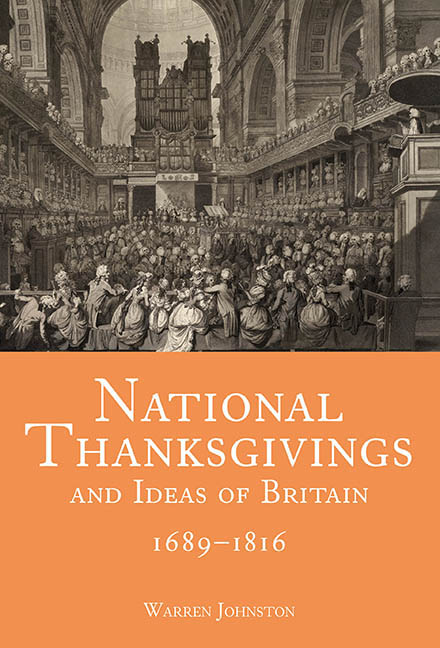Book contents
- Frontmatter
- Dedication
- Contents
- Acknowledgements
- Notes on elements of the text
- List of general thanksgiving days 1689–1816
- Introduction
- 1 Sermons and thanksgiving-day sermons in the long eighteenth century
- 2 Thanksgiving-day sermons – purposes and meanings
- 3 ‘The Palladium of our Safety’ – Providence and Britain
- 4 Political theory and principles
- 5 ‘This Carping Age’ – the politics of unity and discord
- 6 War
- 7 Costs of war and consequences of peace
- 8 Commerce and Empire
- 9 Anglicanism, dissent, anti-Catholicism, and infidelity
- 10 Others and Britons
- Conclusion
- Appendix A Thanksgiving-day preachers’ and sermon details
- Appendix B Denominational breakdown of thanksgiving-day preachers
- Appendix C Main scriptural texts used for thanksgiving-day sermons
- Bibliography of primary sources
- Bibliography of secondary sources
- Index
5 - ‘This Carping Age’ – the politics of unity and discord
Published online by Cambridge University Press: 02 May 2020
- Frontmatter
- Dedication
- Contents
- Acknowledgements
- Notes on elements of the text
- List of general thanksgiving days 1689–1816
- Introduction
- 1 Sermons and thanksgiving-day sermons in the long eighteenth century
- 2 Thanksgiving-day sermons – purposes and meanings
- 3 ‘The Palladium of our Safety’ – Providence and Britain
- 4 Political theory and principles
- 5 ‘This Carping Age’ – the politics of unity and discord
- 6 War
- 7 Costs of war and consequences of peace
- 8 Commerce and Empire
- 9 Anglicanism, dissent, anti-Catholicism, and infidelity
- 10 Others and Britons
- Conclusion
- Appendix A Thanksgiving-day preachers’ and sermon details
- Appendix B Denominational breakdown of thanksgiving-day preachers
- Appendix C Main scriptural texts used for thanksgiving-day sermons
- Bibliography of primary sources
- Bibliography of secondary sources
- Index
Summary
In the preface to his thanksgiving-day sermon in 1695, William Corbin suggested the hostile reception his sermon might meet, stating he had no ambition to appear in print ‘especially in this Carping Age’. Almost a century later, Thomas Scott declared that his sermon scrupulously avoided insulting ‘the political principles of any man’, and he hoped ‘no moderate man of any party will be offended’. These two statements demonstrate that ministers were attuned to the politics and controversies of the day, and that they saw the necessity of steering clear of such subjects. Many sermons through this period repeated the idea that the pulpit was a place where current political controversy should be avoided. This position was affirmed by royal proclamation in the early eighteenth century. Though particularly directed at limiting discussion of anti-Trinitarian views, the 1714 Directions… For the Preserving of Unity in the Church also stipulated ‘That none of the Clergy in their Sermons… presume to intermeddle in any Affairs of State or Government, or the Constitution of the Realm.’ The proclamation did go on to make an exception for ‘Special Feasts and Fasts’, but limited this allowance to going ‘no further than the Occasion of such Days shall strictly require’.
Yet these pronouncements against politicised sermonising are themselves compelling evidence that the pulpit was a place where contemporary political issues received comment, support, and criticism. Remarking on government affairs and actions was not only ubiquitous in society at large, but common in the pulpit as well. In 1798 John Gardiner, vicar of Shirley in Derbyshire, acknowledged accusations that clergy were turning ‘this sacred place into a political theatre’, but he demurred, arguing it was not ‘meddling with politicks, or exceeding our sphere as gospel ministers, to derive inferences from passing events,… to instruct our hearers as citizens or subjects’. Indeed, some preachers saw thanksgiving days as particularly appropriate occasions for such engagement. Responding to the attention his sermons had received for their perceived ‘Reflections and Flurts at the Government’, in 1696 Abdiel Borfet defended himself with the justification that ‘all of ‘em [were] on Publick Fasts or Thanksgiving Days: For on other Days my Sermons are 1000 miles out of this Kenn’.
- Type
- Chapter
- Information
- National Thanksgivings and Ideas of Britain, 1689–1816 , pp. 115 - 150Publisher: Boydell & BrewerPrint publication year: 2020



